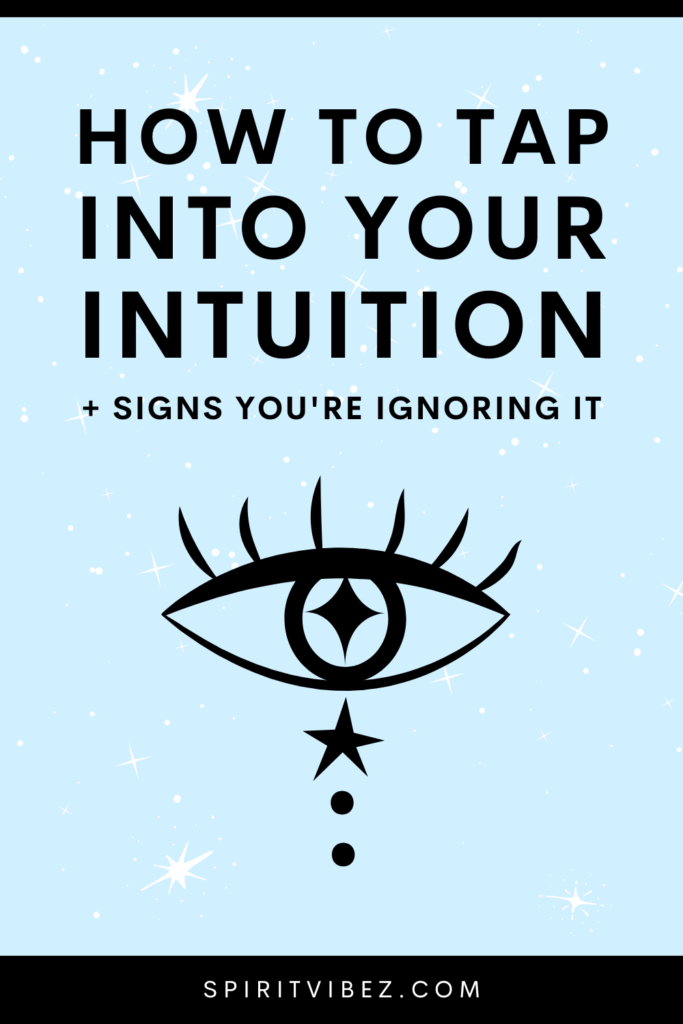Last Updated on December 7, 2023

Do you often find yourself bombarded with information, decisions, and choices that demand your attention?
It’s easy to lose touch with your powerful internal compass in this whirlwind of external stimuli. The internal compass that has been guiding humans for centuries – your intuition.
Just like a hidden treasure waiting to be discovered, your intuition holds the key to better decision-making, heightened self-awareness, and a deeper connection with the world around you.
In this article, you’ll learn how to tap into your intuition, including how to know when your intuition is speaking to you and signs you are ignoring it.
Are you ready to embrace the subtle power within and live a life more attuned to your authentic self? Let’s embark on this transformative exploration together.
Signs you are ignoring your intuition
Embarking on a journey to tap into your intuition requires a keen awareness of the subtle signals your inner self sends your way.
Here are ten unmistakable signs that you might be unintentionally sidelining your intuition, hindering your path to self-discovery and well-informed decision-making.
1. Persistent inner discomfort
Your intuition often communicates through a sense of comfort or discomfort. If you consistently feel uneasy, anxious, or restless about a decision or situation, it may be your intuition signaling that something needs your attention.
2. Physical symptoms
Pay attention to your body’s reactions. Ignoring intuition can manifest in physical symptoms like tension, headaches, or a knot in your stomach. Your body might be trying to tell you something your conscious mind hasn’t acknowledged.
3. Recurring thoughts or dreams
Intuition sometimes speaks through persistent thoughts or recurring dreams. If a particular idea or image keeps resurfacing, it could be your inner self urging you to explore or address a specific aspect of your life.
4. Hindsight regret
Ever looked back on a situation and thought, “I knew I should have listened to my gut”? Ignoring intuition can lead to regrets later on. If you find yourself repeatedly reflecting on missed intuitive cues, it might be time to start tuning in more closely.
5. Feeling stuck or unfulfilled
Disregarding your intuition can result in a sense of stagnation or unfulfillment. If you’re consistently feeling trapped or unsatisfied, it could be a sign that you’re neglecting your inner guidance and need to reassess your choices.
6. Ignoring warning signs
Intuition often gives us warnings about potential risks or red flags in a situation. If you consciously ignore these signs and proceed despite a nagging feeling that something is amiss, you might be neglecting crucial intuitive insights.
7. Difficulty making decisions
Struggling to make decisions, especially minor ones, can indicate a disconnect from your intuitive guidance. When you’re in tune with your inner self, decisions often flow more naturally as you align with your authentic desires.
8. Disregarding first impressions
Your initial impressions of people, places, or situations are often influenced by your intuition. If you find yourself dismissing these impressions without consideration, you might be sidelining valuable intuitive input.
9. Comparing yourself to others
Constantly measuring your success, choices, or life path against others may indicate a lack of connection with your own intuition. Embracing your unique journey and trusting your inner guidance is key to personal fulfillment.
10. Resisting change
Intuition often pushes us toward personal growth and necessary changes. If you’re resisting change despite a persistent feeling that it’s needed, you might be turning a blind eye to your intuition’s guidance.
Recognizing these signs and making a conscious effort to reconnect with your intuition can lead to a more authentic and fulfilling life. As you listen to the whispers of your inner self, you’ll find a valuable source of wisdom guiding you toward choices that align with your truest self.
How to know when your intuition is talking to you
Your intuition often speaks in subtle whispers, and recognizing its voice requires tuning into the nuances of your thoughts, feelings, and physical sensations.
It manifests as a quiet but persistent knowing, a gut feeling, or an unexplained sense of comfort or discomfort. Pay attention to those fleeting moments of clarity or sudden insights that seemingly come from nowhere.
Your intuition may also communicate through dreams, offering symbolic messages that resonate with your waking life.
Trust the quiet nudges and hunches that arise, especially when faced with decisions or situations; they are your intuition guiding you towards alignment with your authentic self.
As you become more attuned to its language, you’ll notice that your intuition often precedes rational understanding, gently urging you in the right direction.
How to tap into your intuition
Tapping into your intuition is a transformative process that involves quieting external noise and cultivating a deeper connection with your inner self.
Here are ten tips to strengthen your intuition:
1. Cultivate mindfulness
Set aside time for regular mindfulness practices, such as meditation or deep breathing. Creating moments of stillness allows your intuition to rise to the surface amid the noise of daily life.
2. Trust your gut feelings
Pay attention to your initial reactions and gut feelings in various situations. Trusting these instincts is often the first step in strengthening your connection with your intuitive responses.
3. Keep a journal
Record your thoughts, feelings, and dreams regularly. Reviewing your journal can help you identify patterns, recurring themes, or intuitive nudges that might be guiding you.
See also:
- Journal prompts for anxiety & overthinking
- Journal prompts to grow spiritually
- Journal prompts for gratitude
- Journal prompts to find your purpose
- Journal prompts for when you feel stuck
4. Embrace creativity
Engage in creative activities that allow your mind to wander freely. Whether it’s drawing, writing, or playing music, tapping into your creative side can open channels to your intuitive insights.
5. Practice active listening
Be attentive to the subtle messages your body sends. Notice physical sensations, tension, or relaxation, as these can be indicators of your intuition guiding you toward or away from a particular choice.
6. Ask yourself open-ended questions
Instead of seeking definitive answers, pose open-ended questions to yourself. This encourages deeper introspection and allows your intuition to offer insights beyond your immediate conscious awareness.
7. Follow your passions
Pay attention to what excites and energizes you. Your passions often align with your authentic self, and by following them, you’re more likely to be in tune with your intuitive guidance.
8. Spend time in nature
Nature has a way of grounding us and connecting us with our inner selves. Take regular walks, hikes, or simply spend time outdoors to foster a sense of calm and receptivity to intuitive messages.
See also: How to connect with nature
9. Learn from past experiences
Reflect on past instances where your intuition proved accurate. Understanding and acknowledging these moments can build confidence in trusting your inner guidance in the future.
10. Detach from outcome
When seeking intuitive insights, release the need for a specific outcome. Allow your mind to remain open and receptive, free from the constraints of preconceived expectations.
Remember, tapping into your intuition is a gradual process that requires patience and practice.
As you incorporate these steps into your daily life, you’ll find yourself forging a more profound connection with your inner wisdom, enhancing your ability to navigate life’s twists and turns with clarity and confidence.
If you enjoyed this article on how to tap into your intuition, I would be grateful if you shared it on Twitter, Facebook, or Pinterest! Thank you❤️
📌 PIN THIS POST FOR LATER


Hello, my name is Sara and I am the founder of Spiritvibez, I’m here to guide you on your spiritual journey toward healing, growth, and self-discovery. I believe that true transformation occurs when the mind, body, and spirit are aligned and working in harmony. Through Spiritvibez, I hope to inspire and empower you to deepen your spiritual practice, embrace your authentic self, and begin living your best life.
